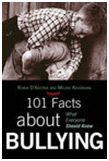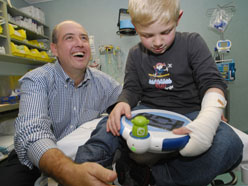Most people would agree that stress increases your risk for illness and this is particularly true for severe long-term stresses, such as caring for a family member with a chronic medical illness. However, we still have a relatively limited understanding of exactly how stress contributes to the risk for illness. In the August 15th issue of Biological Psychiatry, researchers shed new light on one link between stress and illness by describing a mechanism through which stress alters immune function. [continue reading…]
August 2008
Cunningly disguised as a toy, a new medical device that harnesses the power of distraction can greatly reduce the pain felt by young burns victims.
Designed for medical device company Diversionary Therapy Technologies by Sam Bucolo, who is a Queensland University of Technology industrial design Associate Professor, Ditto is a virtual reality-inspired diversionary therapy aid. Professor Bucolo said that the trademarked Ditto device is able to distract a child’s attention to help them through the painful process of having burns dressings changed, which a patient may endure several times before recovery. [continue reading…]
New Book Debunks the Myths of Bullying
 Whether your child is beginning his or her first day of kindergarten, or starting that last year of high school, bullying is a reality every student will face.
Whether your child is beginning his or her first day of kindergarten, or starting that last year of high school, bullying is a reality every student will face.
“One hundred percent of children are touched by bullying as a victim, perpetrator or bystander,” says Dr. Meline Kevorkian, executive director of academic review at Nova Southeastern University in Fort Lauderdale, Fla. and author of book, “101 Facts About Bullying: What Everyone Should Know” (Rowman & Littlefield, September 2008). [continue reading…]
Todays’ New Scientist  discusses why you should follow your instincts.
“When you think that you are referring to your intuition, actually you just learn an association between subliminal signals in your context and the outcome of your actions,” says Mathias Pessiglione, a neuroscientist at the Centre for Neuroimaging Research in Paris, France, who led the study.
Doctors and gamblers may be used to trusting their instincts in make-or-break situations, but scientists have had a tough time proving that the brain can learn subconsciously.
Source: New Scientist, 27 August 2008 ,Ewen Callaway
Â

